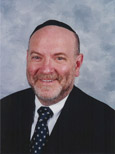HOME LAND SECURITY OR HOME FOR SHABBAT?
It's been a while since we've spoken, so just a reminder as to who I am - you did my husband's conversion a few years ago. I had a religious question and I was hoping you could help. Scott (not his real name) recently gave up construction and started a job with homeland security at LaGuardia Airport. He's scanning bags, looking for dangerous items, bombs, terrorists and so forth, and monitoring people in general. They keep putting him on the schedule for Saturday even though he has asked for the Sabbath off and unfortunately he has to work or lose his job, as unfair as that sounds.
My question is this. Doctors are allowed to work on the Sabbath because what they're doing saves lives (or at least that's what my brother was told when he had to work on Saturday). Truth be told most of the patients they see on the Sabbath aren't life or death scenarios, but I guess they get the okay to work because of the possibility that it could be life or death. Does Scott's job fall under this category of life and death? If being at work stops someone from boarding a plane with a dangerous weapon, that could save hundreds of lives. So I'm wondering if his occupation gets the Sabbath "pass" as well. We're really trying to do the right thing here.
Wish He Were Home for Shabbat
Dear Wish He Were Home for Shabbat,
Shalom, shalom! Thank you for reminding me who you are. That was very sweet of you, but how can I forget you and Scott?! Impossible! It was great to hear from you and I hope all is well.
I'm going to give you an award for asking a question that no one has ever asked. And it is a very interesting question at that. Let's think about it.
First of all, it is clear that pikuah nefesh doheh et haShabbat -- for reasons of saving a life, all Shabbat restrictions are lifted. The principle is necessary since the cessation of all labor on Shabbat would endanger everyone. All doctors taking a day off simultaneously would be endangerment of the first order. And just think about the "disaster-waiting-to-happen" in a community that routinely went one day without active police, fire fighters, doctors, emergency medical technicians, military personnel, or any such professions critical to the safety of a society. One could argue that observant Jews should not enter those professions, but that is a hefty, if not completely unreasonable, price to pay for the observance of mitzvot. God never demanded that we divorce ourselves from the world, only that we infuse it with kedushah (sacredness). So the question is -- does homeland security fall into that pikuah nefesh category?
I think we need to approach this question from two angles -- how to approach it before the work schedule is given out and how to approach it after the work schedule is given out. I want to commend Scott for requesting Shabbatot off. What a terrific guy! I hope that he will continue to remind his superiors of his work preferences and maybe even offer to work those other difficult days -- Christmas, Easter, national holidays -- in exchange for his co-workers' appreciation and accommodation of his own religious sensibilities. I don't think we should rationalize breaking Shabbat since homeland security is so critical to the nation's safety. After all, there are other agents who can fulfill these responsibilities. Taking Shabbat off is Scott's right, protected by the Constitution, and he ought let no one intimidate him into treating it any less than the sacred day it is.
On the other hand, I can only imagine what a challenge it must be to regularly schedule a team of agents to adequately cover the airports 24/7! I would regard Scott's work on Shabbat to fall into that category of saving a life, so at the same time that he needn't volunteer to work on Shabbat, he may rest assured that his work on Shabbat is justified by the pikuah nefesh principle and he should not feel as if he is compromising his religious convictions when he is in face contributing to the nation's well-being.
Be that as it may, I offer a tad of advice to him and anyone else who is compelled, by reasons of pikuah nefesh, to suspend Shabbat. The suspension of Shabbat should be temporary. That is to say, during the 25 hours that Scott is not working on Shabbat, he should really do his best to observe Shabbat. That may seem hypocritical, but it isn't at all. Pikuah nefesh suspends Shabbat only for the period during which it is necessary to save or protect life. Once that period is completed, the rules of Shabbat kick in again. What a great question. In seeing how you treat Shabbat with such respect, my esteem for both of you grows even deeper.
Rabbi Rafi Rank
CyberRav
Return to Cyber Rav ArchivesBack to Top


